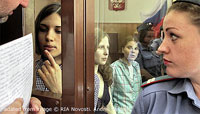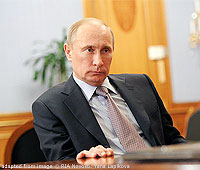Authorities Face Hard Choice in Pussy Riot Verdict
Alexander Bratersky, Nikolaus von Twickel - Moscow Times - themoscowtimes.com - 8.16.12 - JRL 2012-147
MOSCOW, August 16 (Dan Peleschuk, RIA Novosti) - As a Moscow court prepares to decide the fate of punk group Pussy Riot, the Kremlin is faced with a dilemma which could either further embolden the ballooning liberal opposition or alienate the conservative faithful who form the cornerstone of President Vladimir Putin's support base.

file photo

file photoAnd the decision, experts say, is a difficult one for the authorities to make no matter the outcome.
If the women are released, it sends a signal to critics that open protest will now be tolerated, and the Kremlin has grown hesitant to continue its crackdown on dissent, analysts predict. If they are jailed, however, it may only intensify the simmering public discontent with the government.
"Both options are not good," said Masha Lipman, a society expert at the Carnegie Moscow Center. "We're dealing here with a case of miscalculation or actually, a failure to calculate."
Since the end of the trial last week, in which prosecutors asked the court for a three-year prison sentence for the three women Nadezhda Tolokonnikova, 22, Maria Alyokhina, 24, and Yekaterina Samutsevich, 30 speculation over their fate has only grown. They have already spent five months in custody, and two of the women have small children with whom they have been deprived of contact since their incarceration.
When the court delayed the verdict, now expected to be delivered August 17, it was perceived as a move by the authorities to buy time and explore the options. Yet news of the group's prosecution and of the unruly trial itself has reached international proportions and has raised the stakes for the authorities even higher.
And as the verdict is handed down, observers will be watching closely to see just how far the authorities will go to punish dissent during President Vladimir Putin's third term.
Debate has raged in recent weeks over how or even whether to punish the women for their brief "punk prayer" in Moscow's Christ the Savior Cathedral in February. The case has come to represent the greater clash between conservatism and liberalism in Russia, dividing almost evenly people who support Pussy Riot and criticize the authorities, and those who have called for a swift punishment and who support the Putin regime.
"The Russian elite and society are split on the issue, and indeed a decision in one or another direction would alienate the other side," said Alexander Rahr, a Berlin-based independent Russia analyst.
According to a July poll by the Levada Center, about 58 percent of Russians both believers and non-believers believe a jail term for the group would be too excessive, while 33 percent say they would prefer something akin to a suspended sentence. The center polled 1,600 respondents nationwide, and the margin of error is 3.4 percent.
Rahr added that the significance of the case second only, perhaps, to that of jailed former oil tycoon Mikhail Khodorkovsky will likely affect the authorities' handling of the case, and that they may hand down a three-year suspended sentence as a symbolic gesture of compromise.
The flood of support from foreign governments, dignitaries and celebrities has piled up in recent weeks, ranging from the U.S. State Department to pop icon Madonna and actor Danny DeVito. Spontaneous demonstrations have cropped up across Western capitals, including even public readings of the women's closing statements by artists and intellectuals.
"They thought that this would be a locally controlled affair, but now this trial has become internationalized, Rahr said. "The whole world is talking about this, and that fact has to be taken into account. Russia is risking a heavy image blow if it puts these three singers into prison for three years."
While on a visit to London August 2, which coincided with an open letter published in The Times from a variety of British musicians calling for the group's release, Putin hinted the women should receive a lighter punishment than the original seven-year sentence proposed.
"I do not think they should be judged too harshly for that," he told reporters. "I hope they will make certain conclusions themselves. Nevertheless, it is up to the court to make the final ruling."
Experts say Putin's comment, though vague, was a direct signal aimed at those responsible for deciding the women's fate comparable to his statement on the eve of Khodorkovsky's second prison sentence, when he remarked that "a thief should sit in jail."
According to Lipman, the unexpected delay in the verdict points to the authorities' uncertainty about how to rule the case, noting that while it's nearly impossible to know who will make the final call, the "decision will be extralegal."
"There's no doubt that this decision will be taken beyond the walls of the courthouse," she said.
Other experts say the focus of the prosecution team has shifted from producing favorable results for the Kremlin to conducting damage control in a case that has attracted high-profile support for months.
"This issue has a great deal of resonance, and any mistake can cost the judge and the prosecution team their careers," said Pavel Salin, an analyst at the Center for Political Assessments. "That's why there's very likely a discussion going on among those who are involved in the process about the most graceful way out of the situation."
Keywords: Russia, Protests, Politics - Russia, Religion - Russia, Law - Russian News - Russia - Johnson's Russia List
MOSCOW, August 16 (Dan Peleschuk, RIA Novosti) - As a Moscow court prepares to decide the fate of punk group Pussy Riot, the Kremlin is faced with a dilemma which could either further embolden the ballooning liberal opposition or alienate the conservative faithful who form the cornerstone of President Vladimir Putin's support base.

file photo

file photoAnd the decision, experts say, is a difficult one for the authorities to make no matter the outcome.
If the women are released, it sends a signal to critics that open protest will now be tolerated, and the Kremlin has grown hesitant to continue its crackdown on dissent, analysts predict. If they are jailed, however, it may only intensify the simmering public discontent with the government.
"Both options are not good," said Masha Lipman, a society expert at the Carnegie Moscow Center. "We're dealing here with a case of miscalculation or actually, a failure to calculate."
Since the end of the trial last week, in which prosecutors asked the court for a three-year prison sentence for the three women Nadezhda Tolokonnikova, 22, Maria Alyokhina, 24, and Yekaterina Samutsevich, 30 speculation over their fate has only grown. They have already spent five months in custody, and two of the women have small children with whom they have been deprived of contact since their incarceration.
When the court delayed the verdict, now expected to be delivered August 17, it was perceived as a move by the authorities to buy time and explore the options. Yet news of the group's prosecution and of the unruly trial itself has reached international proportions and has raised the stakes for the authorities even higher.
And as the verdict is handed down, observers will be watching closely to see just how far the authorities will go to punish dissent during President Vladimir Putin's third term.
Debate has raged in recent weeks over how or even whether to punish the women for their brief "punk prayer" in Moscow's Christ the Savior Cathedral in February. The case has come to represent the greater clash between conservatism and liberalism in Russia, dividing almost evenly people who support Pussy Riot and criticize the authorities, and those who have called for a swift punishment and who support the Putin regime.
"The Russian elite and society are split on the issue, and indeed a decision in one or another direction would alienate the other side," said Alexander Rahr, a Berlin-based independent Russia analyst.
According to a July poll by the Levada Center, about 58 percent of Russians both believers and non-believers believe a jail term for the group would be too excessive, while 33 percent say they would prefer something akin to a suspended sentence. The center polled 1,600 respondents nationwide, and the margin of error is 3.4 percent.
Rahr added that the significance of the case second only, perhaps, to that of jailed former oil tycoon Mikhail Khodorkovsky will likely affect the authorities' handling of the case, and that they may hand down a three-year suspended sentence as a symbolic gesture of compromise.
The flood of support from foreign governments, dignitaries and celebrities has piled up in recent weeks, ranging from the U.S. State Department to pop icon Madonna and actor Danny DeVito. Spontaneous demonstrations have cropped up across Western capitals, including even public readings of the women's closing statements by artists and intellectuals.
"They thought that this would be a locally controlled affair, but now this trial has become internationalized, Rahr said. "The whole world is talking about this, and that fact has to be taken into account. Russia is risking a heavy image blow if it puts these three singers into prison for three years."
While on a visit to London August 2, which coincided with an open letter published in The Times from a variety of British musicians calling for the group's release, Putin hinted the women should receive a lighter punishment than the original seven-year sentence proposed.
"I do not think they should be judged too harshly for that," he told reporters. "I hope they will make certain conclusions themselves. Nevertheless, it is up to the court to make the final ruling."
Experts say Putin's comment, though vague, was a direct signal aimed at those responsible for deciding the women's fate comparable to his statement on the eve of Khodorkovsky's second prison sentence, when he remarked that "a thief should sit in jail."
According to Lipman, the unexpected delay in the verdict points to the authorities' uncertainty about how to rule the case, noting that while it's nearly impossible to know who will make the final call, the "decision will be extralegal."
"There's no doubt that this decision will be taken beyond the walls of the courthouse," she said.
Other experts say the focus of the prosecution team has shifted from producing favorable results for the Kremlin to conducting damage control in a case that has attracted high-profile support for months.
"This issue has a great deal of resonance, and any mistake can cost the judge and the prosecution team their careers," said Pavel Salin, an analyst at the Center for Political Assessments. "That's why there's very likely a discussion going on among those who are involved in the process about the most graceful way out of the situation."